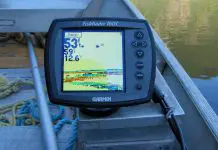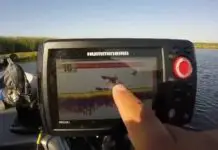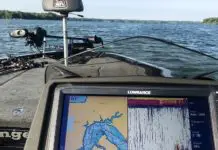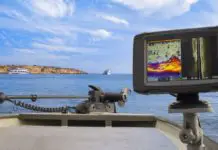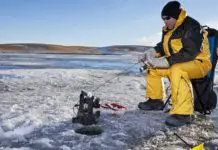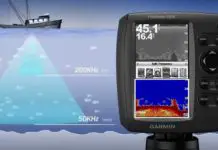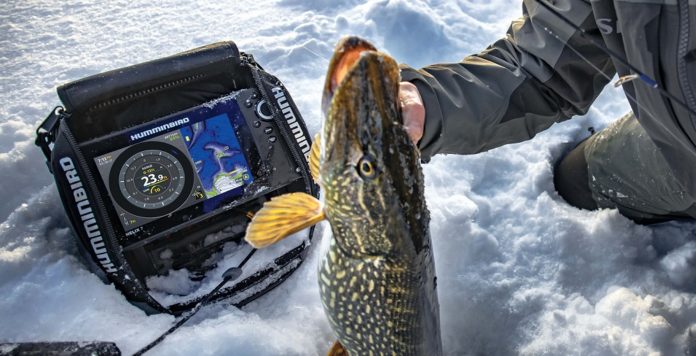
There’s no mistake about it! Winter comes every year and to fishermen that means a couple of things.
First, the summer heat is fading away and many species of fish will be pretty active prior to the real cold temps of winter during the fall months. Secondly; it’s time to consider winterizing your boat and this includes things beyond just the batteries and fluids. It also means taking care of your electronics such as fish finders and even trolling motors.
Why take a chance on ruining a high dollar investment such as your fish finder to the cold temps and harsh weather depending on where you live? For that matter, even if you purchased a budget piece of electronics you should still want to protect it as well.
I can make this article real short by simply stating that you should follow the directions in your user manuals when it comes to winterizing. But to be honest, how many of us keep those little booklets?
Table of Contents
Isn’t my Fish Finder Weather Resistant?
For the most part the answer to the question is yes. For the sake of argument the majority of fishing electronics are built to withstand the elements when you are out on the water. A summer storm, late afternoon shower, drizzle, and fog.
Even air temperatures are taken into consideration. The problem is that those elements only last for a few minutes or hours and the actual exposure time is relatively low when you consider finding cover and wiping things down when the rain ends.
In the winter time a boat on a trailer parked in the driveway with a loose cover will face the elements for an extended period of time. Those cold and dry winter days can be mixed with moist and drizzle filled days. Think about those mornings on the lake or river when it took a second or two longer for your fish finder to seem like it was performing at a hundred percent.
That happened when you were fishing all of the time and using your equipment on a regular basis. The moisture in the air and temperature on that cool morning affected the performance of your equipment.
Now think about those conditions happening daily only you’re not in the boat to check on things and keep everything maintained. So yes, your fish finder may be weather resistant but why take a chance.
Winterizing
First, let me say that I know not every person that owns a bass boat stores it haphazardly in the driveway with loose fitting covers. Some do, some don’t, some have heated garages, some store the boats covered and protected in storage facilities at the marina. So please excuse these general guidelines. I’m just asking that when you winterize your boat’s fluids and starting batteries that you take this into consideration.
It’s a good idea to remove electronic equipment such as your fish finder from your kayak or boat and store them properly inside during long periods of time when not in use such as winter. The same goes for items such as your battery operated items, and even smaller trolling motors.
Electronics that you choose to leave on a boat that operate on batteries should have the batteries removed. This includes everything from emergency handheld radios to flashlights. Avoid the corrosion! Portable electronics should be removed and stored in their protective cases indoors as well.
There is some good news for those that don’t want to take the time to remove electronics that are tough to get to. You can store in place! If you have items that are permanently mounted, or installed and difficult to remove, it’s fine to leave them in place. Just make sure you take a minute to be sure that they are dry. You could also consider covering them with a thermal protector like you would a battery.
Don’t use plastic or like materials that could capture moisture in the air and cause condensation. I had a friend that used pieces of foam as insulation and rubber bands. He would wrap the entire console and electronics as best as possible with the foam and use rubber bands and tape to hold things in place. He would then toss a couple of moth balls in a plastic butter dish and set it in the middle of the boat before covering.
A couple of years ago he upgraded his foam insulation. “Hey Wes, I like the purple foam you’re using this year,” I said while I watched him winterize his boat. “Yep, it’s my wife’s old yoga mat!” You guessed it – he ended up buying a brand new yoga mat for his wife!
Bottom Line and Sinker!
The bottom line is that a boat and all of the electronics on it are more than just a hobby item for people that love to fish. It’s an investment and it should be properly taken care of during the winter months or when not in use for a long period of time.
When you start winterizing your boat in the traditional manner you should consider the vast number of electronics that boats are adorned with these days.
A few minutes of effort in the late fall will equal less frustration, and possibly hits to your wallet, in the spring when the fish start biting again!
























